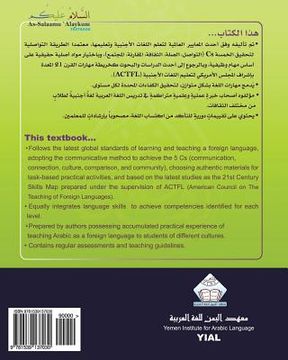As-Salaamu 'Alaykum textbook part five: Textbook for learning & teaching Arabic as a foreign language (en Árabe)
Reseña del libro "As-Salaamu 'Alaykum textbook part five: Textbook for learning & teaching Arabic as a foreign language (en Árabe)"
"Assalamu 'Alykum textbook series.. - Follows the latest global standards of learning and teaching a foreign language, adopting the communicative method to achieve the 5 Cs (communication, connection, culture, comparison, and community), choosing authentic materials for task-based practical activities, and based on the latest studies as the 21st Century Skills Map prepared under the supervision of ACTFL. - Equally integrates language skills to achieve competencies identified for each level. -Prepared by authors possessing accumulated practical experience of teaching Arabic as a foreign language to students of different cultures. - Contains regular assessments and teaching guidelines. After completing this textbook, the learners will be able to: 1. Talk about concrete issues from the Arabic culture such as: sacred places in the Islamic culture and other cultures, theater and cinema arts, agriculture, sources of power in the world, natural catastrophes, digital emperors, Islamic architecture, calligraphy, decoration, problems related to environment, and comparing these issues with similar ones of the learners' cultures. 2. Extract main ideas and specific information from the reading texts. 3. Comprehend listening texts, answer the questions, and express their points of views. 4. Express orally and compose in written their opinions and points of views about the issues presented. 5. Exercise morphological forms including: hollow verbs in present, past, and imperative forms, passive forms in present and past tenses, present participle and past participle, and irregular verbs. 6. Use grammatical rules correctly including: present verb in the indicative, subjunctive and jussive forms, five verbs, ......, dual forms, five nouns, regular female plurals, and indeclinable nouns. 7. Use main connectors (chronological phrases, but, although, in brief, on the other hand, ...) correctly. 8. Write reports, use proverbs properly, distinguish between words that end with open (ta), and closed (ta), elision in some words, punctuations (semicolon, question mark, exclamation mark, parentheses, colon and hyphen), writing formal letters, and writing thoughts. 9. Use famous conditional particles (reason and result). 10. Know the written errors, and to be able to correct them. 11. Exercise writing paragraphs from the textbook issues. 12. Comprehend Islamic and Arabic culture from the topics presented in the textbook such as: the most important mosques in the Islamic culture, Great mosque in Sana'a, prayers in Islam and Christianity, the situation of cinema and theater recently in the Arab world, climate in Arab world generally and in Yemen particularly, agriculture terraces in Yemen, carrier pigeons in the past, the importance of cleanliness in Islam and how it is related to environment. 13. Practice new learning strategies such as: prepare written reports about certain topics or activities, presentations in the classrooms and sharing them on the social media sites, suggesting solutions for problems, and conducting social campaigns in the surrounding community. "

